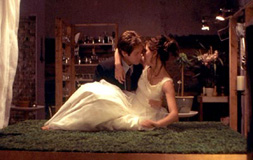|
Newest Reviews:
New Movies -
The Tunnel
V/H/S
The Tall Man
Mama Africa
Detention
Brake
Ted
Tomboy
Brownian Movement
Last Ride
[Rec]≥: Genesis
Hara-Kiri: Death of a Samurai
Indie Game: The Movie
Abraham Lincoln: Vampire Hunter
Old Movies -
Touki Bouki: The Journey of the Hyena
Drums Along the Mohawk
The Chase
The Heiress
Show
People
The Strange Affair of Uncle Harry
Pitfall
Driftwood
Miracle Mile
The Great Flamarion
Dark Habits
Archives -
Recap: 2000,
2001, 2002,
2003, 2004
, 2005, 2006,
2007 , 2008
, 2009 ,
2010 , 2011 ,
2012
All reviews alphabetically
All reviews by star rating
All reviews by release year
Masterpieces
Screening Log
Links
FAQ
E-mail me
HOME
| |
Secretary (Steven Shainberg, 2002)
 Itís not just Angelo Badalamentiís score that tips off
the audience that theyíre entering territory that David Lynch seems to have
already staked out while watching Secretary.
The set design, peppered with a combination of suburban blandness and the
antique weirdness of the law office in which most of the film plays out, seems
as if it was cobbled together from Blue
Velvetís
leftovers. The mannered performances are either wildly over the top or
almost catatonic, giving the impression that the characters are somewhat lost in
their dreams or their inability to achieve them. The problem with paying homage
to a vision as unique as Lynchís is that itís tough to top a master at his
game. David Lynch films, for all their grotesque flourishes, manage to create a
tactile enough atmosphere that itís undeniable that someoneís obsessed over
the sordid details. That obsessiveness makes the film attractive, even if the
thing being photographed is ugly. Director Steven Shainberg doesnít seem so
fixated on his S&M fantasy that the energy becomes attractive. As such, the
audience, who probably wonít share the fetishes of the main characters, will
probably find it difficult to see the attraction or even be sure that the
attraction is felt intensely by those characters. Even as the stakes are raised
in Secretaryís sexual give and take, the movie retains its detached,
private mood.
Itís not just Angelo Badalamentiís score that tips off
the audience that theyíre entering territory that David Lynch seems to have
already staked out while watching Secretary.
The set design, peppered with a combination of suburban blandness and the
antique weirdness of the law office in which most of the film plays out, seems
as if it was cobbled together from Blue
Velvetís
leftovers. The mannered performances are either wildly over the top or
almost catatonic, giving the impression that the characters are somewhat lost in
their dreams or their inability to achieve them. The problem with paying homage
to a vision as unique as Lynchís is that itís tough to top a master at his
game. David Lynch films, for all their grotesque flourishes, manage to create a
tactile enough atmosphere that itís undeniable that someoneís obsessed over
the sordid details. That obsessiveness makes the film attractive, even if the
thing being photographed is ugly. Director Steven Shainberg doesnít seem so
fixated on his S&M fantasy that the energy becomes attractive. As such, the
audience, who probably wonít share the fetishes of the main characters, will
probably find it difficult to see the attraction or even be sure that the
attraction is felt intensely by those characters. Even as the stakes are raised
in Secretaryís sexual give and take, the movie retains its detached,
private mood.
 Secretary won a special prize at the Sundance film
festival for its ďoriginalityĒ, but perhaps that originality is what keeps
it from feeling sufficiently inclusive. Iíd never call David Lynch unoriginal,
but his films are chock full of imagery that seems to have been chosen so that
it can to trigger of the collective conscious. Nothing in Secretary feels
eerily familiar. Itís too abstract for its own good. If the film played out in
a realm even resembling reality, its character arcs might have some sort of
emotional resonance, but the stylization used does more to make the material
safe than it does to heighten its themes. Certainly the exclusivity thatís
exuded here hammers home the point that oneís sexuality is an individualized
thing, but that point barely makes watching someone elseís fantasy more
exciting. Neither of the lead performances, which come courtesy of Maggie
Gyllenhaal and James Spader, is charismatic enough to draw us in. The oddball
supporting cast, which includes a spastic Jeremy Davies and a ghastly Lesley Ann
Warren, doesnít help either.
Secretary won a special prize at the Sundance film
festival for its ďoriginalityĒ, but perhaps that originality is what keeps
it from feeling sufficiently inclusive. Iíd never call David Lynch unoriginal,
but his films are chock full of imagery that seems to have been chosen so that
it can to trigger of the collective conscious. Nothing in Secretary feels
eerily familiar. Itís too abstract for its own good. If the film played out in
a realm even resembling reality, its character arcs might have some sort of
emotional resonance, but the stylization used does more to make the material
safe than it does to heighten its themes. Certainly the exclusivity thatís
exuded here hammers home the point that oneís sexuality is an individualized
thing, but that point barely makes watching someone elseís fantasy more
exciting. Neither of the lead performances, which come courtesy of Maggie
Gyllenhaal and James Spader, is charismatic enough to draw us in. The oddball
supporting cast, which includes a spastic Jeremy Davies and a ghastly Lesley Ann
Warren, doesnít help either.
* *
Jeremy Heilman
12-08-02
|